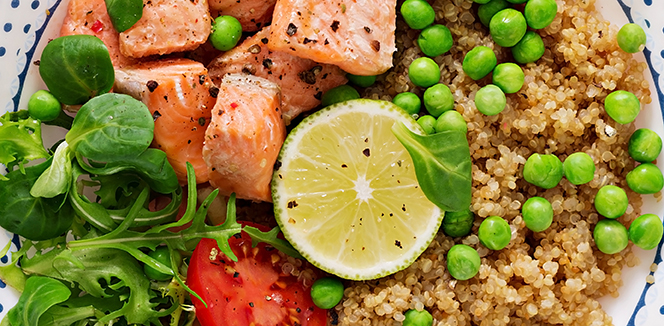Start now. Just one week of preparation can have profound effects on how your body responds to an illness like the Coronavirus when exposed. Whether or not a cold virus makes it past our mucus membranes and into our bloodstream depends on how healthy we are at that moment. Fortify yourself now with these five steps:
1. Diet is the single most important way to prevent any illness.
Inflammatory foods cause the body to have to fight on too many fronts at once, thus distracting its ability to focus on an invading virus. Minimize inflammation in your body by eating a plant-based, non-inflammatory diet. Here are the components of an anti-inflammatory diet.
(a) Cruciferous greens (kale, broccoli, bok choy, cauliflower, spinach, brussels sprouts, collards, water cress, arugula, radishes, dandelion greens).
(b) The onion family of foods including leeks, garlic, and shallots.
(c) Eat mushrooms in broth and soups. Eat berries, fresh fruits and consider taking Elderberry syrup twice a day.
(d) Whether gluten-free or not, avoid all refined grains such as pasta and bread. These are just like eating sugar to your body. If you need fast carbs, try whole foods like red or sweet potatoes, beans, avocados, whole corn tortillas, beets, or red lentil pasta.
(e) Avoid dairy, meaning cheese, milk, and yogurt. In many people, cow dairy is extremely inflammatory and changes the nature of mucus production in the respiratory system, leading to more inflammation, and less healthy mucus membranes.
(f) Note your sugar intake. Sugar cripples your immune system.
(g) Minimize your alcohol intake. Alcohol is an immunosuppressant so it dulls the immune system’s ability to fight.
(h) Eat live foods and take probiotics. Live foods include sauerkraut, fresh raw produce, and kimchi.

2. Consider taking a high quality algae oil or fish oil supplement.
Omega 3 fats are an important part of an anti-inflammatory diet as they tamp down chronic inflammation. There is evidence that these fats are particularly helpful in lung health. Foods high in Omega 3 fats include mackerel, salmon, sardines, chia seeds, flax seeds and walnuts.

3. Check your Vitamin D level or take Vitamin D.
At the end of winter, when the sun has been low in the sky for months, our vitamin D levels are low. Preferably you can check your Vitamin D level at your doctor’s office. If not, take 25,000 IUs of Vitamin D one time, and then 1000 IU each day. Better yet, as the sun gets higher in the sky, sit outside with your skin exposed for 20 minutes on warm days.

4. Sleep.
Many studies show that the most significant risk factor for developing a full-blown cold-type illness, if exposed, is sleep deprivation. Winding down the brain before going to bed is crucial for a restful nights sleep. After 8 p.m. think books, bath, talking, or being bored. What did we do at night before technology? Avoid alcohol and food three hours before bedtime. If you do have a rough night sleep, rest the next day for 30 minutes two or three times.

5. Move your body, everyday, even if only a little. Movement means blood flow and quicker cellular regeneration.

What to do if you, or someone you care for, gets the Coronavirus
1. Go to bed.
At the first sign of sickness go to bed, or at least stay on your sofa. See feeling bad as a good thing. Body aches, bone aches, headache, sore throat and fatigue are the way your body communicates with your mind. These symptoms are a plea for you to rest so your body can focus on fighting. Your body is a warrior. Warriors don’t eat, email, or watch TV while they are fighting. They put all their energy into the battle.
The first sign of a COVID-19 infection is a sore throat, fatigue, and prostration (feeling the need to lie down). Within 24-48 hours the upper respiratory system (nose, trachea and sinuses) are infected. Body aches develop. On day 4 or 5 the virus makes its way down into the lungs. With this can come worsening symptoms of fever, bone and body aches and a significant and very dry cough. Coughing can be relentless and cause abdominal muscle strain or even rib injuries. This is a viral pneumonia and can be serious with the COVID-19 virus. If you do get short of breath, feel like you are drowning or can’t get enough air, or can not breath because of so much coughing, contact or seek medical help immediately. Sooner is better than later.

2. Avoid traditional over-the-counter cold and flu medications.
Do not take NSAIDs (Advil, Aleve, Naproxen, Ibuprofen), Tylenol, or over-the-counter cold and sinus medications such as Advil Cold and Flu, Afrin, phenylephrine, or chlorpheniramine.
About these medications:
(a) They trick you into thinking you feel well enough to go out, clean your house, or even eat, when really your body wants to focus on figuring out the virus and fighting it.
(b) They blunt your fever response which is a tool your body uses to fight illness. Only fevers over 103.5 need treatment with anti-pyretics (fever reducers).
(c) NSAIDs can cause kidney damage in people who are dehydrated (which is often the case with an illness) or who have hypertension or cardiac disease.
(d) Tylenol is toxic to the body’s mitochondria (your intracellular energy-producing center).
(e) OTC anti-histamines and decongestants dry out your mucus membranes which might make you feel better in the short-run but in fact weakens your membranes ability to act as a barrier that keeps the virus out of your bloodstream.
(f) NSAIDS (like Advil and Naproxen) irritate the lining of your gut, making it leaky and thus less effective in preventing virus entry into the blood stream.

3. Instead, use natural symptomatic treatments.
If you need symptom relief try:
Umcka for sore throat, headache and fever
Sambucol Cold and Flu for cough, fever and pain
Hot baths with Epsom salts for body and bone aches,
Cold compresses for fever relief
Drinking electrolyte water (Ultima brand or Nuun brand) for muscle aches
Homeopathy for body aches (Eupatorium perfoliatum).
Use an eyepatch and guided meditations or meditative music to reduce visual stimulation and light. This helps the mind transcend discomfort.
4. It’s OK to Fast.
If you are really hungry eat, but if you are not, don’t. Drinking water is crucial, but eating is not. If you are hungry, try baked potatoes or sweet potatoes or non-dairy vegetable soups with clear broth.
5. Be aware of Day 4.
The respiratory symptoms of the Coronavirus are the most serious, and they occur on Day 4 or 5 of the illness. So for the first four days of the virus be hyper-vigilant about prioritizing resting and caring for yourself.
6. Drink water, or water with electrolytes.
Water helps wash out immune system metabolites, allowing faster rejuvenation of damaged cells.
7. Make a plan.
Whether you live alone or not, have someone who is available at all times to get you water, help you up, and get you medical help should you need it.

Protecting yourself from the Coronavirus if there is an outbreak in your area

1. Protect yourself and others in public.
Never touch your face. Think of your hands as having something gross on them at all times. Do not rub your eyes, pick your nose, bite your fingernails, or eat without washing your hands. Wear your glasses or think about getting some clear lens glasses to keep virus droplets out of your eyes, and to remind you not to rub your eyes.

2. Keep your distance.
If you can smell someone’s breath, hear their cough, or hear the mucus rattling in their nose, then you are too close. If you are in a high-risk group for getting a serious case of the illness, stay home.

3. Avoid fomites.
Fomites are objects that viruses can live on for hours. These include elevator buttons, pets, doorknobs, door handles, groceries, toilet handles (but who would ever want to touch those anyway), faucets and even fabric. Use a paper towel to touch these surfaces. If you do have to touch them, wash your hands asap. Hand sanitizing is iffy business (because they are not all effective against viruses, and have to stay wet and in contact with your hands for 4 minutes before they kill viruses), and so can lull you into complacency. They may be better than nothing, but hand washing with soap and water is the best way to get rid of the virus on your hands.
4. Be empowered to care for others.
If you do have symptoms, even mild symptoms, stay home.
5. Have enough of your essential prescription medications on hand,
so you won’t have to go out should you get sick or should you need to avoid going out during an outbreak.
Written by Angela Hind, MD / angelachind@you-md.com / 828.768.8866 / You MD / LinkedIn





